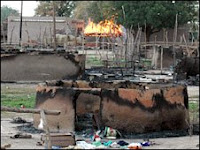 (Image from UNAMID)
(Image from UNAMID)
Though well-written, former US Secretary of State Madeline Albright's June 11 op-ed in the New York Times, "The End of Intervention," utilizes language that is too strong and misleading.
Humanitarian Intervention is NOT dead.
Albright makes the following three points as a premise to make her argument:
- "Totalitarian governments are alive and well." -- This is true. Burma is used as an appropriate example in the article.
- "Their neighbors are reluctant to pressure them to change." -- Also true. ASEAN has been doing little to effectively pressure the government of Burma to stop its atrocities. South Africa failing to respond adequately to the current crisis in Zimbabwe is another contemporary example of this.
- "The notion of national sovereignty as sacred is gaining ground." -- Maybe. Albright argues that Iraq and Afghanistan has helped lead to national sovereignty becoming more prominent in global politics.
But...really? Didn't the UN Security Council (China included) authorize one of the world's largest armed peacekeeping forces to Darfur? Haven't peacekeeping forces in the Congo, the Balkans, and Cyprus been renewed? Isn't intervention into Somalia currently being debated?
Humanitarian intervention is definitely not impossible in today's climate. It still exists and is being continued. Though Albright's 3 points effectively highlight some of the challenges that the international community is facing, that is what these are - challenges. With grassroots support, these and other obstacles (like China) were overcome with UN Security Council Resolution 1769 authorizing UNAMID, the peacekeeping force now being deployed in Darfur to the disappointment of Khartoum. Though the process has severe faults, it is a fact that the troops are being deployed.
The Global Conscience's "Confusion"
Albright also says:
"The global conscience is not asleep, but after the turbulence of recent years, it is profoundly confused. Some governments will oppose any exceptions to the principle of sovereignty because they fear criticism of their own policies. Others will defend the sanctity of sovereignty unless and until they again have confidence in the judgment of those proposing exceptions."
Though national sovereignty is a factor in the process to decide to intervene, Albright misses the main challenge that has been "confusing" governments throughout history: national interest. It's not that states are afraid to get the UN approval to invade sovereign territory. When going about it via a multilateral approach that is strongly supported for a just cause (e.g. Burma), such a course of action is not only legal (as authorized by Chapter VII of the UN Charter) but will also be highly-acclaimed internationally.
What is hindering governments from intervening is not the "sanctity of sovereignty" but the sanctity of their own interests. Without sufficient political or economic interest, heads of states usually do not see any reason to expend political, economic, human, and military resources to go intervene and stop human rights violations from occurring. Especially in our current plummeting economy, from the standpoint of the leader of a country, intervening in, for example, the middle of desert in Africa simply does not make sense. It is just not within the interest of the country. Intervention is not only extremely expensive but may take the tolls of many lives (ie: Black Hawk Down). This major challenge to intervention has and will always exist.
So, back to Albright's argument -- has the climate changed regarding the role of national interest in decisions to intervene after Iraq? A little bit. As Albright points out, the unilateral nature of the US invasion has raised skepticism of intervention and led to delegitimizing UN authority.
However, the UN is still somewhat functioning and has just as much teeth as it has always had (not too much). More importantly, a hybrid UN-African Union armed peacekeeping force was successfully authorized to Darfur in 2007 (post-Iraq) - a monumental accomplishment.
So what does this mean?
- As in the case of Darfur, the threshold of overcoming national interest (and other challenges) to intervene can be breached through grassroots support. Whether humanitarian intervention continues to happen or not is really up to how much the people of the world care.
- The case of Burma. People cared about Burma but nothing happened. Why? The answer is simple. As Albright puts it, the international system is "a collection of legal nuts and bolts cobbled together." It takes a lot of time to get through these nuts and bolts. It took over 2 years of work and a number of failed resolutions to get UNAMID authorized. Unfortunately, there is no way this could have been accomplished for Burma in less than one month.
- So how do we fix it? This is the million-dollar question this blog is constantly searching for. UN reform obviously, but how? How can we create an international mechanism that can effectively and efficiently respond to humanitarian crises such as Burma? Any comments will be much appreciated!








